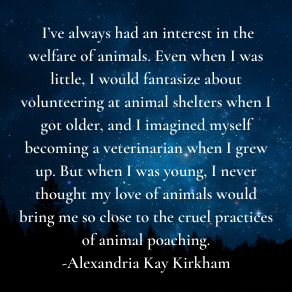
I’ve always had an interest in the welfare of animals. Even when I was little, I would fantasize about volunteering at animal shelters when I got older, and I imagined myself becoming a veterinarian when I grew up. But when I was young, I never thought my love of animals would bring me so close to the cruel practices of animal poaching.
I experienced first-hand the consequences of rhino poaching over the summer of 2019 when I traveled to Zimbabwe to volunteer at a local sanctuary to rehabilitate and release injured animals. For the first few days of my trip I was filled with blissful ignorance as I was in awe of coming face to face with lions, leopards, and monkeys. I felt as if I was in a paradise until this illusion I had created was dissolved by a horrible truth. It was the fifth day of my trip when I visited Matopos National Park, a nearby animal reserve dedicated to the protection of rhinos. What I expected to be a fun safari to see rhinos turned into one of the most impactful experiences of my life. It was there that my blindfold of ignorance was removed to reveal the horrors poaching I had never realized or accepted to be so true. I was shocked to see an entire national park of rhinos rid of their horns in an attempt to prevent poaching and park rangers with guns meant to shoot on sight for those who dared try.
I was told gruesome stories about rhinos left for dead when their horns were savagely removed to be sold on the black market. Beautiful creatures who were mutilated because of a superstition surrounding their horns. It was at this national park that my interest in this issue sparked. That day I continued to learn more from those who were on the front lines of the war against poaching. I listened to the experiences of park rangers who had dedicated themselves to protecting these animals. It was in Zimbabwe, experiencing for myself what I could have so easily ignored back home, I decided I wanted to learn more to do what I could to stop rhino poaching.
Throughout the remainder of my trip, I continued to seek the insight of others as I traveled around the country. I met one local who had a deep passion for the welfare of rhinos. He told me about CITES, an international agreement and convention between governments concerning the trade of endangered species. His passion for this issue inspired me research more about the organization when I returned home. I learned about a unique solution that many members of CITES were trying to get passed. A combative approach to poaching that would legalize the trade of rhino horns. The more I studied the issue, the more interested I became. However, through learning about so many attempts to stop rhino poaching, I determined there couldn’t be a simple answer to such a complex problem. I think the issue requires the consideration of multiple perspectives to reach a solution.
When contemplating this issue, I remember that while listening to the stories of those in Zimbabwe, many always paused in their stories to sympathize with the conditions that forced some to turn to poaching in what they considered their only option to support themselves and their families during desperate times. While these stories and my experience in Zimbabwe allow me to begin understanding this perspective, I still can’t accept that a society cannot exist where poaching no longer must be the only option. I support many of the various approaches to decrease and prevent rhino poaching. However, I believe that poaching will only end through solving the reason for its existence. Efforts must be made to correct the misinformation surrounding the value of rhino horns and provide relief to those who feel they must turn to poaching for their own survival. Only then can this needless killing of animals end.
